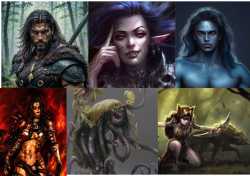[40 / 4 / ?]
Quoted By:
The gods were not born—they were.
Timeless and terrible, they shaped the void with thought and gave it order through song. Where their voices harmonized, land rose from the deep. Where their wills diverged, seas churned and the stars cracked. And when they had made a world fit for beauty and pain alike, they wove beings from golden light and named them the High Men.
These radiant children were not like the lesser beasts. They were given form eternal, bodies immune to time, and minds sharp as the storm’s edge. For thousands of years, the High Men built cities of living marble and floating stone, where music never ceased and sorrow was but a word in ancient texts. They learned to speak to fire and command the tides, and they dwelt close to the gods, basking in divine favor.
But nothing perfect lasts.
No one remembers precisely what shattered the age of glory. Some say the gods quarreled and turned their faces from the world. Others claim a great wrong was done by one of the High Men—a theft, or a murder, or a forbidden love. Whatever the truth, the Cataclysm came. Mountains split. Rivers turned to acid. The sky wept ash for a hundred years. And immortality cracked like fragile glass.
The High Men died in droves. Their shining cities fell into the sea or were swallowed by the earth. Some of the survivors pleaded with the gods for mercy. None answered. In desperation, a few turned elsewhere—to older powers, darker names carved into the bones of the world. They drank blood. They swore oaths. They became Vampires, no longer truly alive, but no longer dying. They fed on others’ lifeforce to survive, trading sunlight for eternity.
A cure was eventually discovered. It burned the curse from their veins—but not without cost. Those who took it became known as the Primeval, their skin forever marked with a bluish hue, their hunger undiminished, though no longer for blood. Their bodies healed fast, sometimes too fast. They were changed, and their children were born changed too. Neither god nor man would claim them. So they claimed nothing—and no one.
In the thousand years since, the world has shifted again. The High Men, though fewer and mortal now, have rebuilt some of their ancient halls. The Vampires brood in hidden places, fractured into cults and courts. The Primeval wander or form enclaves where the wild grows thick. And outside these crumbling legacies, the world keeps birthing the strange.
The Barbarians of the far west, unmarked by old glories, have come raiding, wielding iron and prophecy.
The Aberrations, born of warped magic and cataclysmic exposure, slither in the forgotten reaches of the world—each one a living riddle.
And the Witches, those rare few who have found power not from gods or curses, but from within—walk the line between reverence and exile, their fingers stained with the threads of fate.
Timeless and terrible, they shaped the void with thought and gave it order through song. Where their voices harmonized, land rose from the deep. Where their wills diverged, seas churned and the stars cracked. And when they had made a world fit for beauty and pain alike, they wove beings from golden light and named them the High Men.
These radiant children were not like the lesser beasts. They were given form eternal, bodies immune to time, and minds sharp as the storm’s edge. For thousands of years, the High Men built cities of living marble and floating stone, where music never ceased and sorrow was but a word in ancient texts. They learned to speak to fire and command the tides, and they dwelt close to the gods, basking in divine favor.
But nothing perfect lasts.
No one remembers precisely what shattered the age of glory. Some say the gods quarreled and turned their faces from the world. Others claim a great wrong was done by one of the High Men—a theft, or a murder, or a forbidden love. Whatever the truth, the Cataclysm came. Mountains split. Rivers turned to acid. The sky wept ash for a hundred years. And immortality cracked like fragile glass.
The High Men died in droves. Their shining cities fell into the sea or were swallowed by the earth. Some of the survivors pleaded with the gods for mercy. None answered. In desperation, a few turned elsewhere—to older powers, darker names carved into the bones of the world. They drank blood. They swore oaths. They became Vampires, no longer truly alive, but no longer dying. They fed on others’ lifeforce to survive, trading sunlight for eternity.
A cure was eventually discovered. It burned the curse from their veins—but not without cost. Those who took it became known as the Primeval, their skin forever marked with a bluish hue, their hunger undiminished, though no longer for blood. Their bodies healed fast, sometimes too fast. They were changed, and their children were born changed too. Neither god nor man would claim them. So they claimed nothing—and no one.
In the thousand years since, the world has shifted again. The High Men, though fewer and mortal now, have rebuilt some of their ancient halls. The Vampires brood in hidden places, fractured into cults and courts. The Primeval wander or form enclaves where the wild grows thick. And outside these crumbling legacies, the world keeps birthing the strange.
The Barbarians of the far west, unmarked by old glories, have come raiding, wielding iron and prophecy.
The Aberrations, born of warped magic and cataclysmic exposure, slither in the forgotten reaches of the world—each one a living riddle.
And the Witches, those rare few who have found power not from gods or curses, but from within—walk the line between reverence and exile, their fingers stained with the threads of fate.

